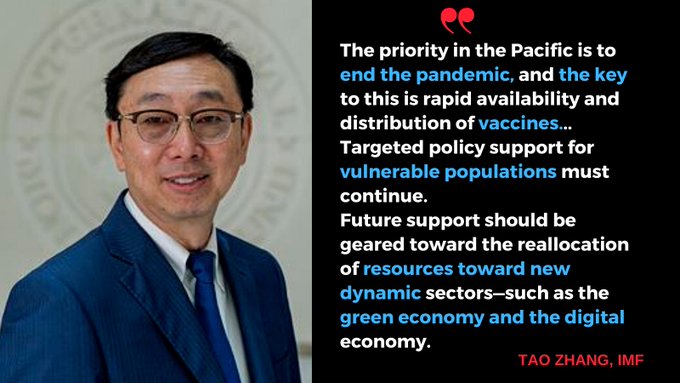Fiji is among other Pacific island countries that will face a longer period of recovery from the impact of COVID-19 because it has depended on tourism as a major income.
In addressing the Forum Economic Ministers Meeting from Washington DC in America Tuesday, International Monetary Fund deputy managing director Tao Zhang said the region may not get back to the tourism level it experienced in 2019 and recovery may happen after 2023.
“For tourism-reliant countries, including Fiji, Palau, Samoa, and Vanuatu, the recovery will take longer,” Zhang said.
“Our best guess is that the region may now get back to 2019 tourism levels before 2023. Beyond the pandemic, Pacific Islands face severe daunting challenges.”
He said the priority in the Pacific is to end the pandemic. And the key to this is rapid availability and distributions of vaccines.
“Let me here, highlight three. First, higher public debt has added to pre pandemic vulnerabilities in several countries. This issue is all the more pressing, given the investment needed to enhance climate and natural disaster resilience and to address infrastructure deficiencies, and human capital development.
“Second, losses of correspondent banking relationships CBRs, threaten remittances, business income and fiscal revenues. The decline in the number of the CBRs is a global phenomenon, but is particularly problematic in the Pacific and reflect the assessment by banks of the risks relative to the profitability of this business.
“Third, Pacific Islands are particularly exposed to the negative effects of climate change. They have less capacities to adapt to changing climate conditions, and the natural disasters that accompany such change. For some of the islands, climate change is a existential threat. Work on the economics of climate change and adaptations in the IMF has already increased substantially,” said Zhang
He said targeted policy support for vulnerable populations must continue.
“Future support should be geared towards reallocations of resources towards new dynamic sectors such as the green economy and the digital economy. All stakeholders must preserve external financial lifelines. The IMF is helping to find solutions by providing AML-CFT training, and facilitating dialogue among the stakeholders.
Further down the road, key tasks include ensuring sustainable public finances, enhancing resilience to shocks, dealing with excess leverage in corporate and quasi-fiscal sectors, adapting to climate risk, and enhancing the resilience and productivity of growth models with upgraded infrastructure, and human capital,” he said.
Zhang said global cooperation is vital to avoid developing countries falling further behind the rest of the world.
“First, ending the pandemic everywhere requires further coordinated global actions. IMF staff recently proposed a US$50 billion plan to end the pandemic by vaccinating at least 40% of the people in every country by the end of this year, and 60% by mid-2022. The most urgent part of this plan is to redirect excess vaccine doses from advanced economies to the developing world. About 1/3 of the plans –US$35 billion dollars in grant financing– has now been secured. But the work must continue to raise the rest.
“Second, beyond vaccines, ensuring sufficient financial support for weaker economies is essential. This includes grants from bilateral donors and international financial institutions, and debt relief and rescheduling. The debt service suspension initiatives, DSSI, and its extensions have provided welcome relief for more than 40 countries and a common framework for debt treatments beyond the DSSI should be made operational.
“Third, the proposed general allocation of SDRs of the US dollar equivalent 650 billion can help meet the need to supplement reserves, and support recovery effort of vulnerable countries.
“Finally, poorer economies will need support to facilitate the transition to cleaner energy sources, and invest in climate adaptation, that renders them more resilient to climate shocks.
So, IMF is committed to all of this important work to promote global cooperation, and I can assure all of you that we will do our own part to the utmost,” said Zhang.
SOURCE: FIJI TIMES/PACNEWS














